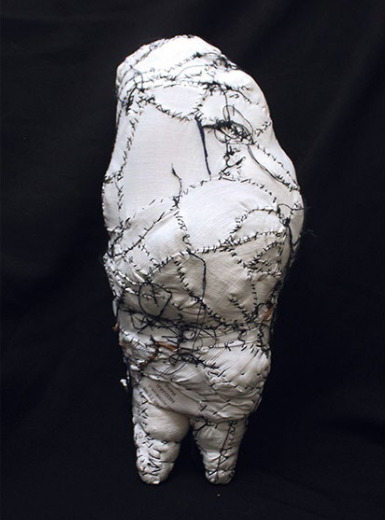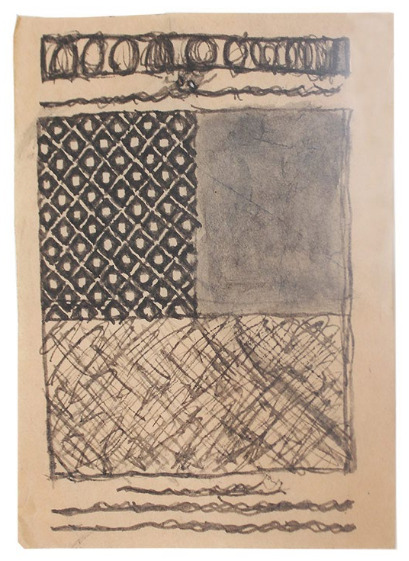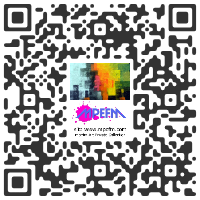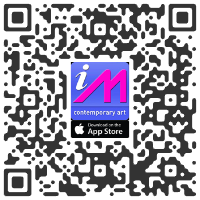"in abstracto"
Aouam Abdelarrazzak, Jacqueline B, Beverly Baker, Franco Bellucci, Thérèse Bonnelalbay, Anibal Brizuela, Fernand Desmoulin, John Devlin, James Castle,
Pepe Gaitán, Alexandro Garcia, John Urho Kemp, Zdenek Kosek, Joseph Lambert, Raphaël Lonné, Albert Moser, Michel Nedjar, Yuichi Saito, Patricia Salen,
Leopold Strobl, Pascal Tassini, Melvin Way, Hong Xie, Henriette Zéphir, deux artistes anonymes

GALERIE CHRISTIAN BERST
3-5, passage des gravilliers 75003 paris+33 (0) 1 53 33 01 70 e-mail:
june 8 > july 7, 2017
 Michel Nedjar sans titre | untitled (poupée coudrée), 2016 coudrage de tissus et fils, 31.5 x 14 x 12 cm. cloth coudrage and thread, 12.4 x 5.5 x 4.72 in |
 James Castle sans titre | untitled (patterns with title abstraction #1), circa 1915. suie et salive sur papier de récupération, 16.5 x 13 cm. soot and spit on found paper, 6.5 x 5.12 in |
Art brut and abstraction: one wouldn’t necessarily think of putting both terms together; they
might even seem to be incompatible.
Nevertheless, the christian berst gallery art brut, presents
in abstracto
, a collective exhibition of abstract works produced by 26 classic and contemporary
artists.
Until now, the notion of abstract Art Brut amounted, at best, to an oxymoron, and at worst, to antinomy. Now, should we allow ourselves to look at the works, rather than blindly allowing the exclusions that Jean Dubuffet based his theory on, we must accept the evidence: in numerous ways, many works of Art Brut escape the figuration to which we thought we could limit this domain.
Already in 1922, the psychiatrist Hans Prinzhorn preferred his patients’ works which revealed “a more “pure” state inasmuch as the gesture that created them wouldn’t be subject to the interferences of cultural conditioning and artistic skill,” as Raphael Koenig points out in the text of our catalogue, to the ones that were much too narrative. Dubuffet, in putting together his conception of Art Brut, notably in opposition to the abstract art that was popular in his day – at most, he would accept the seismography of spiritualists – probably didn’t see to what extent non-figurative Art Brut widened his quest for essentialness considerably.
Thus, abstract Art Brut, according to the profound movement from which it comes, takes the most diverse forms: there is the compulsive and gestural form of one Baker or one Bonnelalbay; that other one where sibylline cosmologies stretch out, as in the work of Kemp or Way; the one where psychic cartographies are traced out, dear to Salen and Košek; the cryptographic and symbolic form of one Devlin and one Gaitán ; also the one that is the fruit of psychic trances experienced by Lonné or Zéphir; yet another whose volumes transfigure the materials that compose them, as in Bellucci and Tassini’s work; not to mention the geometric abstraction of one Moser or one Brizuela, and so many others. As many forms of expression whose eloquence and intensity echo Rimbaud in A Season in Hell: “I used to write down silences and nights, I made note of the indescribable. I captured dizzy spells.”
Until now, the notion of abstract Art Brut amounted, at best, to an oxymoron, and at worst, to antinomy. Now, should we allow ourselves to look at the works, rather than blindly allowing the exclusions that Jean Dubuffet based his theory on, we must accept the evidence: in numerous ways, many works of Art Brut escape the figuration to which we thought we could limit this domain.
Already in 1922, the psychiatrist Hans Prinzhorn preferred his patients’ works which revealed “a more “pure” state inasmuch as the gesture that created them wouldn’t be subject to the interferences of cultural conditioning and artistic skill,” as Raphael Koenig points out in the text of our catalogue, to the ones that were much too narrative. Dubuffet, in putting together his conception of Art Brut, notably in opposition to the abstract art that was popular in his day – at most, he would accept the seismography of spiritualists – probably didn’t see to what extent non-figurative Art Brut widened his quest for essentialness considerably.
Thus, abstract Art Brut, according to the profound movement from which it comes, takes the most diverse forms: there is the compulsive and gestural form of one Baker or one Bonnelalbay; that other one where sibylline cosmologies stretch out, as in the work of Kemp or Way; the one where psychic cartographies are traced out, dear to Salen and Košek; the cryptographic and symbolic form of one Devlin and one Gaitán ; also the one that is the fruit of psychic trances experienced by Lonné or Zéphir; yet another whose volumes transfigure the materials that compose them, as in Bellucci and Tassini’s work; not to mention the geometric abstraction of one Moser or one Brizuela, and so many others. As many forms of expression whose eloquence and intensity echo Rimbaud in A Season in Hell: “I used to write down silences and nights, I made note of the indescribable. I captured dizzy spells.”
QR of press release



 Beverly Baker |
 Franco Bellucci |
 Anibal Brizuela |
 John Devlin |
 James Castle |
 Pepe Gaitán |
 Alexandro Garcia |
 John Urho Kemp |
 Zdenek Kosek |
 Albert Moser |
 Michel Nedjar |
 Henriette Zéphir |
Vernissage :
thursday june 8 from 6 pm to 9 pm
a bilingual (FR/EN) 200 pages catalogue prefaced by raphaël koenig is published.
a bilingual (FR/EN) 200 pages catalogue prefaced by raphaël koenig is published.







